

Tao Te Ching
Search Sages
Enter all or part of an sage's name or biography in the fields below, then press tab or enter to filter the list of Authors. Click the headings Name or Biography to sort by that column. Diacritics are ignored when searching.
Click on the author's name to go to their page.
| Author Name | Biography |
|---|---|
| Helen Pitts Douglass | 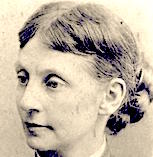 Helen Pitts Douglass Helen Pitts DouglassDescendant of Mayflower Pilgrims, Helen Pitts Douglass was a dedicated abolitionist active in the women’s rights movement. Putting her philosophy into practice, she went against her parents, friends. neighbors and subjecting herself to both white and black scorn, married an African American, Frederick Douglass. After he died, she spent years traveling and lecturing for social justice and established the Frederick Douglass memorial now administered by the National Park Service. |
| Helena Roerich | 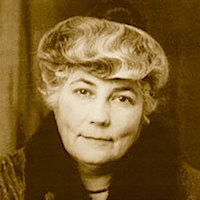 Helena Roerich Helena RoerichTheosophist, translator, archeologist, adventurous traveler to unknown inner and outer realms, founder of the Institute of Himalayan Studies, co-creator of the "Agni Yoga" practice of “Living Ethics”; Helena Roerich with her husband Nicholas fearlessly explored remote regions of Mongolia, Tibet, India, China, and the Altai regions of Russia. During these travels, they discovered rare manuscripts, enclaves of wisdom, and many insights into the cultural unity of diverse people. This led to her writing 20 books including the 1926 "Foundations of Buddhism" that helped spark an early Western interest in Buddhism. She co-authored an international treaty signed by heads of 22 countries that helped protect historical monuments, scientific and artistic institutions. A frequent correspondent with president FDR and VP Henry A. Wallace, she was at first a positive influence but then a political liability that led to Wallace’s defeat by Harry Truman. |
| Heleni Kazantzakis | 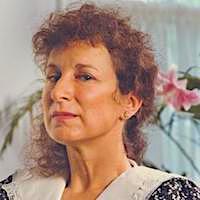 Heleni Kazantzakis Heleni KazantzakisOrphaned at 15, Heleni Samiou met—and fell in love with—Nikos Kazantzakis when she was 21 and he was 41. They lived together for 20 years before marrying in 1945. Although writing several books herself and even winning literary awards, she mainly dedicated herself to supporting her husband's writing career by transcribing his manuscripts. For example, using only a small typewriter, she typed and re-typed his 33,330 verse epic poem, The Odyssey, seven times. Many of her suggestions and ideas became integral parts of his work. After Nikos died, Heleni moved to Geneva where she created a welcoming environment for literary circles, Kazantzakis fans, and Greek freedom fighters. She was persecuted by the Greek military dictatorship, captured as a prisoner of war by Turkish soldiers, and escaped with the aid of British helicopters. She donated the profits from Nikos' books as relief aid to the families of political prisoners after the Turkish invasion of Cyprus in 1974. |
| Heloise | 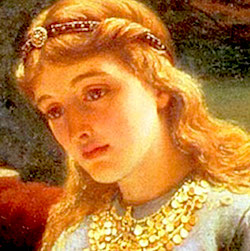 Heloise HeloiseAn orphan raised in a convent, Héloïse became a brilliant scholar, one of the earliest and most radical feminists, a powerful abbess over multiple convents, and half of one of the most famous and talked about relationships of her era. As femme fatale to Peter Abélard when he was on the rise toward becoming a pope, her influence caused him immense humiliation and pain as well as the inspiration for some of the most important books of the time, a regard for the sense over the words, and a declaration of philosophical independence for reason over belief. It’s become a tradition for the hoping-to-find-true love to leave letters at their crypt. |
| Henri-Louis Bergson | 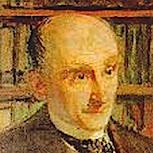 Henri-Louis Bergson Henri-Louis Bergson The Plotinus of our era, proponent of the Lucretian tradition, awarded the 1927 Nobel prize in Literature and France’s highest honor the Grand-Croix; Bergson developed an open and nonsystematic philosophy based on mystical experience and a revolutionary concept of Multiplicity to replace dualism and Hegel’s dialectic. Close friend and collaborator with William James; Nikos Kazantzakis studied under him, his ideas on creative evolution influenced Teilhard de Chardin, and his ideas were provocative enough to be condemned by the Vatican and criticized by Bertrand Russell, Heidegger, Sartre, T.S. Eliot, Julian Huxley, Einstein, even Virginia Woolf. A Jew converted Catholic, he emphasized immediate experience and intuition over reason and science — the sense over the words. |
| Henrik Ibsen | 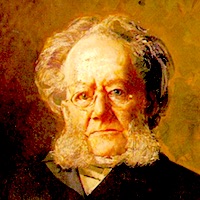 Henrik Ibsen Henrik Ibsen"The world's 2nd most-performed playwright" One of his time's most influential dramatists, Ibsen became—after Shakespeare—the world's most performed playwright. Considered a founder of theatre modernism and realism, he became on of the most influential playwrights of the 19th century. Examining the dark underside of his contemporary culture, many thought his works scandalous and they were both intensely loved and hated. The hated side forced him into poverty, self-imposed exile, and the wrath of critics. Nominated for the Nobel Prize in Literature 3 times, he became a strong influence on other influential writers like Eugene O'Neill, Oscar Wilde, Arthur Miller, James Joyce, and George Bernard Shaw. One of his plays, the 1879 A Doll’s House, became almost universally popular and was still the world's most performed play in 2006 |
| Henry David Thoreau | 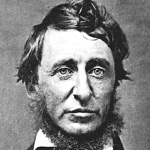 Henry David Thoreau Henry David ThoreauFather of environmentalism and America's first yogi Dedicated abolitionist, "America's first yogi," champion of nature and the natural, “father of environmentalism;” Thoreau brought a little Lao Tzu into 19th Century America. Instead of following in the pattern of his piers leading a life of “quiet desperation,” Thoreau followed much more in the Tao Te Ching’s style of Wu Wei. His non-violent approach to opposing slavery and the Mexican-American War inspired future leaders like Gandhi and Martin Luther King. Although one of America's most famous writers, during his lifetime his most famous book, Walden didn’t sell enough copies to pay for the paper it was printed on. |
| Henry Ford | 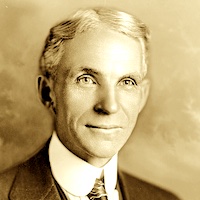 Henry Ford Henry Ford |
| Henry James | 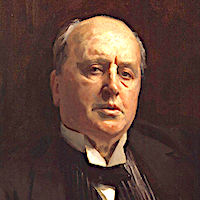 Henry James Henry JamesOne of history’s greatest novelists, brother of William James, and 3-time Nobel Prize nominee; Henry James pioneered experimental literary techniques that deepened characters from overly simplistic caricatures to realistic depictions of ambiguity, paradox, and contradiction. Breaking from the romantic tradition of Charles Dickens, he experimented with literary styles and introduced more realism trying to involve readers more personally and influence them emotionally rather than just as distant and uninvolved observers. This attracted much criticism but also evolved literary styles to include more emphasis on psychological states of mind and the ability to inspire. |
| Henry Louis Mencken | 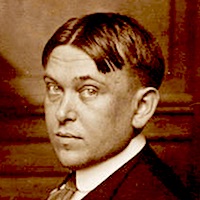 Henry Louis Mencken Henry Louis Menckenalt.right founding father Racist, anti-Semitic white nationalist and alt.right founding father; Mencken was the first to publish Ayn Rand who took him as the greatest representative of her philosophy, individualism. He strongly opposed representative democracy which he described as a way for the inferior to dominate the superior. Hiding his more hate-filled and racist view in a secret diary that could not be published until 25 years after he died, he wrote influential and respected articles and books for over 40 years — influential and respected because people didn't understand the malignant foundations for his views. Revered by many writers and journalists for his insightful writing and sometimes brilliant political commentary, the National Press Club in Washington named a library in his honor and the Baltimore Sun still gives an annual writing award named after him. He was also a serious scholar well-known for his research on American language, how English is spoken in the US. |
| Henry Miller | 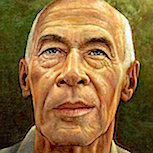 Henry Miller Henry MillerBanished from the UK, literary bohemian in 1930’s Paris, painter of over 2,000 watercolors, author of over 50 books (many banned for a generation), anti-Vietnam War voice, “one of the most iconoclastic literary spirits of our time,” legendary lover from Anaïs Nin to Playboy magazine star Brenda Venus when he was 84 years old; he pioneered new literary forms, attacked respectability, broke cultural taboos, and in one of the main events in 1960’s sexual revolution, won a Supreme Court decision on obscenity. Continuing a tradition from Dostoyevsky, Balzac and Nietzsche; he was an important influence on Jack Kerouac, Philip Roth, Alan Ginsberg and Norman Mailer who called him “the writer’s writer.” |
| Henry S. Mindlin | 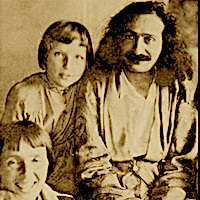 Henry S. Mindlin Henry S. MindlinPoet, musician, spiritual seeker |
| Henry Thomas Buckle | 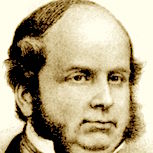 Henry Thomas Buckle Henry Thomas Buckle “The Father of Scientific History,” son of a wealthy London merchant and shipowner, one of the world’s best chess players of his time, and winner of the first British chess tournament; Buckle was homeschooled with only one year of formal education. He loved reading, collected over 22,000 books, and taught himself eighteen foreign languages saying, “I was never much tormented with what is called education.” Though with good reason, his works were highly criticized; he pioneered an approach toward history and a scope of vision later taken up and accomplished by Will and Ariel Durant. |
| Heraclitus | 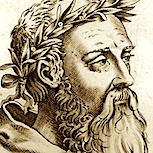 Heraclitus HeraclitusA Greek Buddha Lonely, self-taught wisdom pioneer who like the Buddha abdicated his inherited kingship; Heraclitus also like the Buddha stressed the ever-present quality of impermanence and change, the importance of humans waking up from unconsciousness, and the unity of opposites. Devoted to the principle of inscrutability, he was known as "the Obscure" and wrote only for the wise and not “the rabble.” Born just 28 years after the Buddha, he emphasized the central Buddhist doctrine of impermanence and is famous for his quote, "No man ever steps in the same river twice.” Also contemporary with Lao Tzu, he mirrored the teaching of yin and yang regarding the soul as being a mixture of fire and water, light and dark. |
| Hergé | 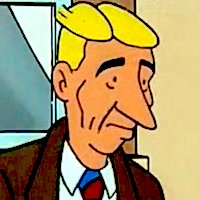 Hergé HergéIntrepid reporter of world culture Hergé translated world culture—from the past and future, from Native American, African, European, Mid-Eastern, South American, Chinese, and Tibetan—to a world only beginning to open its eyes to a new political and social consciousness just beginning to transcend nationalism. He created a visually engaging, highly entertaining, and wisdom transmitting art form that became one of the 20th century’s most popular publications. Although the early Tintin cartoons and books were used as propaganda by a conservative Catholic newspaper, steered away from political views during the German occupation of Belgium, and although Hergé himself was accused of racism and arrested four times; his positive impact on international consciousness steadily increased as more than 120 million Tintin books were sold and translated into 40+ languages. His travels introduced him to Asian thought which deeply influenced his message. He described his political views by quoting Chuang Tzu. |
| Herman Melville | 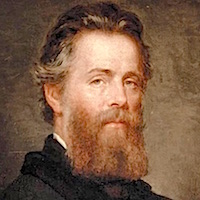 Herman Melville Herman MelvilleOne of the best and most influential of all American writers but almost forgotten and unknown during the last 30 years of his life when he had to take a job as a Customs Inspector; Melville brought myth, scripture, philosophy, and mystical imagery to his haunting novels. Drawing on his adventurous ocean travels, he wrote Moby Dick which was a commercial failure and strongly criticized when first written but became a world classic described by D. H. Lawrence as "the greatest book of the sea ever written" and "one of the strangest and most wonderful books in the world.” Portraying the delicate dance between truth and illusion, the impossibility of deep and mutual communication, and the search for the absolute in the relative; his works gave a deep and powerful color to world literature. |
| Hermann Hesse |  Hermann Hesse Hermann HesseGuiding light for a world-wide cultural transition, spiritual teacher to the Beat generation, poet at heart and in life, soul of his age; Hesse was expelled from a Protestant seminary, denounced by the German media when he protested German’s involvement during WWI, and his books were banned and destroyed by Hitler. The 20th century’s most widely read European author, his books personify the balance between freedom and equality, the individual and society and the integration of opposites extolled by the non-thought lineages. After writing Nobel Prize-winning book, The Glass Bead Game, he devoted his life to mentoring young people and collaborating with peers like Thomas Mann and Carl Jung. He wrote over 30,000 letters to hundreds of different correspondents |
| Herodotus | 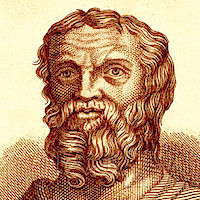 Herodotus Herodotus“The Father of History” “The Father of History” and first known historian to systematically collect and investigate facts, Herodotus described the purpose of his efforts “to prevent the traces of human events from being erased by time, and to preserve the fame of the important and remarkable achievements.” While the accuracy of his accounts is often questioned, he worked hard to corroborate his stories. From an internationally-minded port city and widely traveled, he describes many of his accounts from an eye-witness perspective. With an overarching theme of civilizations in conflict, he collected oral histories during his travels, thought about their meanings and interpreted them. Not only reporting on ancient science, he also speculated on scientific, cultural, geographical, and historical questions. His role in bringing ancient wisdom into modern understanding is immense. |
| Heshang Gong | 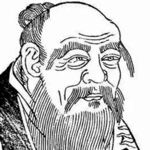 Heshang Gong Heshang GongOne of the two most famous commentators on the Tao Te Ching, Heshang Gong was one of the first to emphasize Taoist yoga and meditation practices. Not only meant to explain, he stressed the practical implications and ways Lao Tzu’s wisdom can guide and enrich everyday life. Almost every commentary since has used his as a foundation. He merged Lao Tzu’s political and ethical teachings into a guide for both individuals and emperors. |
| Hesiod | 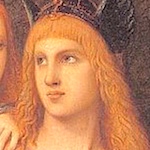 Hesiod Hesiod“History’s first economist” Called “history’s first economist,” farm hand, singer, epic poet of the people; Hesiod used his poetry to paint and establish religious customs, Greek mythology, good farming practices, and a foundation for the poor to overturn the injustices and inequality of the kings and aristocracy. He protested against injustice, furthered the understanding of astronomy and time keeping, the economics of sea trade, and gave meaningfulness to creativity and hard work. While Homer extolled the hero, the rich and powerful; Hesiod championed the working classes and the common person (though not women). |